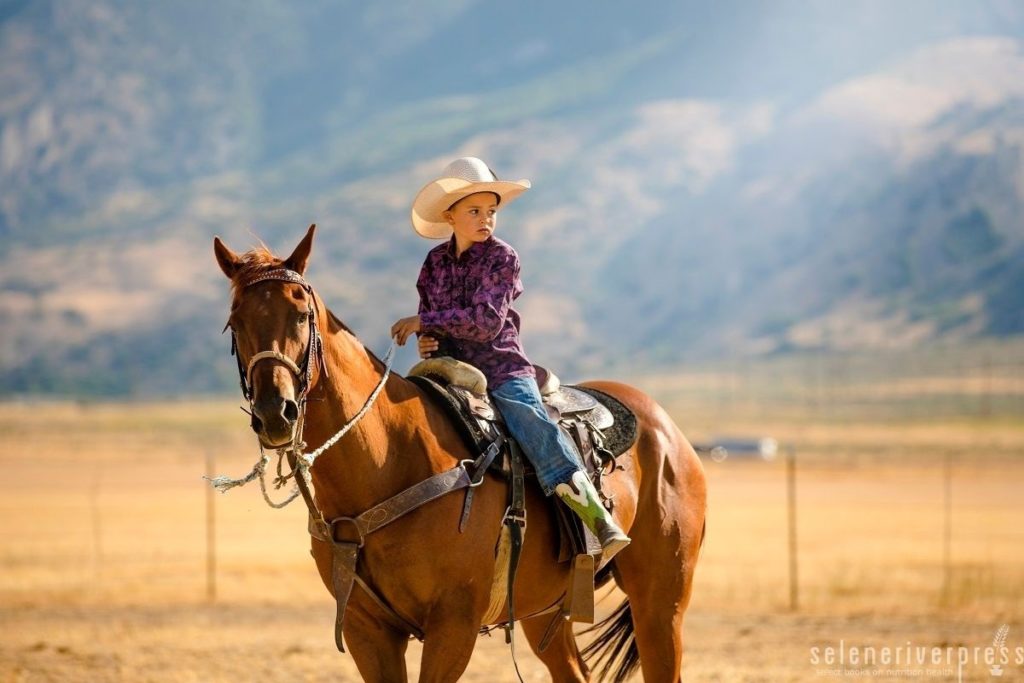Welcome to “The Royal Principles of Health,” written by Dr. Michael Dority and presented by Selene River Press. This fascinating series is based on the 33 principles of chiropractic identified by R.W. Stephenson, DC, PhC, in his 1927 classic Chiropractic Textbook. Dr. Dority calls these the “Royal Principles of Health” and invites you to learn how these foundational tenets illustrate the forces of universal intelligence that guide and determine our existence.
Are You the Horse or Rider?
Royal Principle #8 states: “The function of intelligence is to create force.”
As a child on the farm, one of my duties was to follow the cattle from the trail to their pastures on foot. But when I turned seven or eight, I was promoted to riding on a huge, magnificent horse named Starr. Just a youngin at the time, I thought this meant I was on the road to becoming a real cowboy.
My dad told me that Starr could sense my fears, and if I was afraid she would hold back from her job with the cattle to protect me. I thought, “Me, afraid?”
I thought I was brave, but Starr knew otherwise. As she walked along with the cattle, she always seemed to know when to direct an unruly calf back onto the trail—even if I was reining or spurring to the contrary. I tried not to express my inner fears. After all, I was a real cowboy now.
Principle # 8 from the Chiropractic Textbook by R.W. Stephenson states: “The function of intelligence is to create force.”
Now I thought I was a smart, fearless rider, but Starr knew me better than I knew myself. In my mind, the function of my intelligence (my brain) was to rein and/or spur Starr, creating a force to “control” her movements. Through our coordinated actions (the brain talking to the body and the body talking back to the brain), we could bring those unruly cows (symptoms) back into order. Except, in our case, I could not get Starr to obey any of my commands. We had a failure to communicate (symptoms/disease).
Though it was not known to me at the time, following today’s thinking we may have medicated Starr to address her symptoms of noncompliance. Or perhaps my parents could have medicated me to address my lack of assertiveness in horse commands and control. Either way, this would just be treating the symptoms rather than addressing the cause of the problem. Instead, my Dad addressed the cause with a joyful confidence in me and acknowledgement of the pressure I felt. His patience led me back to my hope of becoming a real cowboy.
When Dad asked me what the trouble was, I explained that Starr would not obey my commands. My dad was very plousios, the Greek word for great riches, enriched beyond measure, and extravagant lavishness. He lavished me with praise (plousios) for the things I could do with Starr and for making sure that all the cows reached the pasture. After he gave me encouragement and made me feel proud of myself, he showed me what I could change to be a better (healthier) rider. This positive exchange made me realize that I could be better—and I was.
As we learn, our intelligence grows and we expand our forces to achieve our wants and desires. This is Principle #8. Research into psycho-neurophysiology and somato-neurophysiology shows that positive or homeostatic input (affirmative internal dialogue) and physical movement (exercise) improves our overall health and wellbeing. In my case, positive input came from Dad’s encouraging words and thoughts, and the spinal bio-mechanics of my movement in the saddle served as my exercise.
Nociception, or negative body thoughts, influences our global physiological state, causing stress and adaptive physiology. Think of a phrase like I was so afraid I wet my pants! Fear creates stress, which travels over the nerve pathways in our spinothalamic tracts, and in turn talks to the amygdala in the brain, where we feel stress and anxiety, thus causing the very thing we were afraid of—wetting our pants.
The amygdala “tastes” all stimuli and signals in our body, and from this it produces appropriate emotional reactions. From here, signals are sent into the hypothalamus, where the stress response is activated, causing the adrenals to release adrenaline. As a boy on my horse, I would either fall off in fear and cry, or up my courage and ride like a real cowboy.
In 1895, D.D. Palmer, our founding father of chiropractic, declared that feelings and emotions affect our physiology. He recognized that our natural state of health—the homeostatic balance of our nervous system—can get “bucked off its horse” by stress.
Helping your body to show itself strong is vital for survival. A safe, effective way to enhance your health and vitality is through chiropractic and nutritional care. The Neuro Emotional Technique taught by Scott Walker, DC, is a method of finding and removing neurological “static” related to negative emotions and stress.
Standard Process supports the organs related to stress with the following nutrition:
- Adrenal Desiccated and/or Drenatrophin PMG: For the adrenal gland.
- Neuroplex and Neurotrophin PMG: For the brain and nervous system.
- Min-Tran: For that “on edge” nervousness. This is for the rider in life who feels nervous and can’t relax while in the saddle.
And for the master control system, we have chiropractic spinal adjustments to correct vertebral subluxations in areas of spinal stress. This care restores communication from the brain to the body and from the body to the brain, thus reducing physiological stress. Remember, structure affects function.
Get back on your horse and ride like the wind. The function of our intelligence is to create force (to heal). By giving our patients the knowledge to make intelligent, positive decisions regarding their health, we create a force within them (self-empowerment) to make better choices. In this way both the horse and the rider wins. Our patients will be plousios with health—and with thankfulness for our ability to help them naturally. We are blessed in return.
Always remember, the greatest among you is the servant of all.
Some things to think about:
- When you greet your patients ask them, “How can I help you today?”
- We serve by planting health concepts—others harvest them.
- Search out and attend Dr. James L. Chestnut Wellness and Prevention Paradigm seminars.
- Order, study, and learn from Vitamin News by Dr. Royal Lee.
“Faith in oneself is the best and safest course. A man paints with his brains and not with his hands.”
—Michelangelo
Images from iStock/diane39 (main), LightFieldStudios (post).


